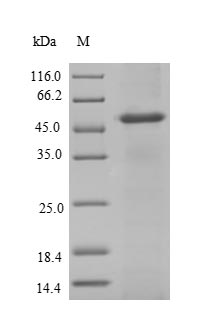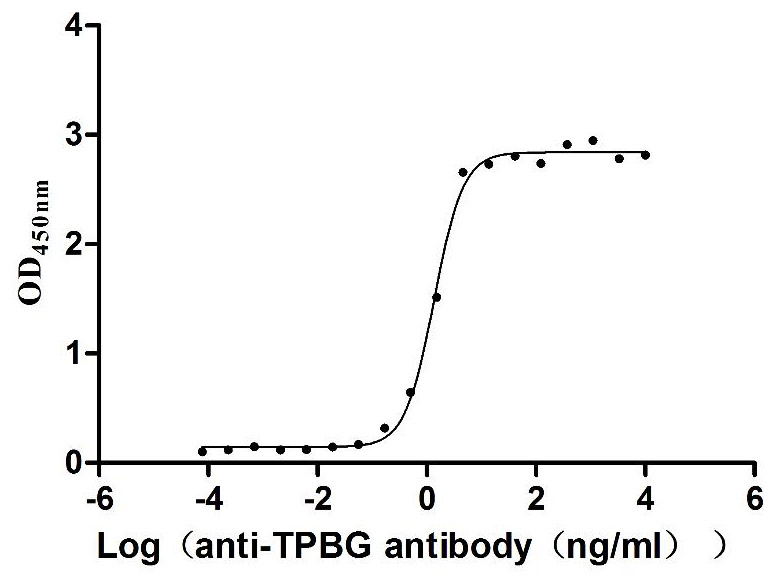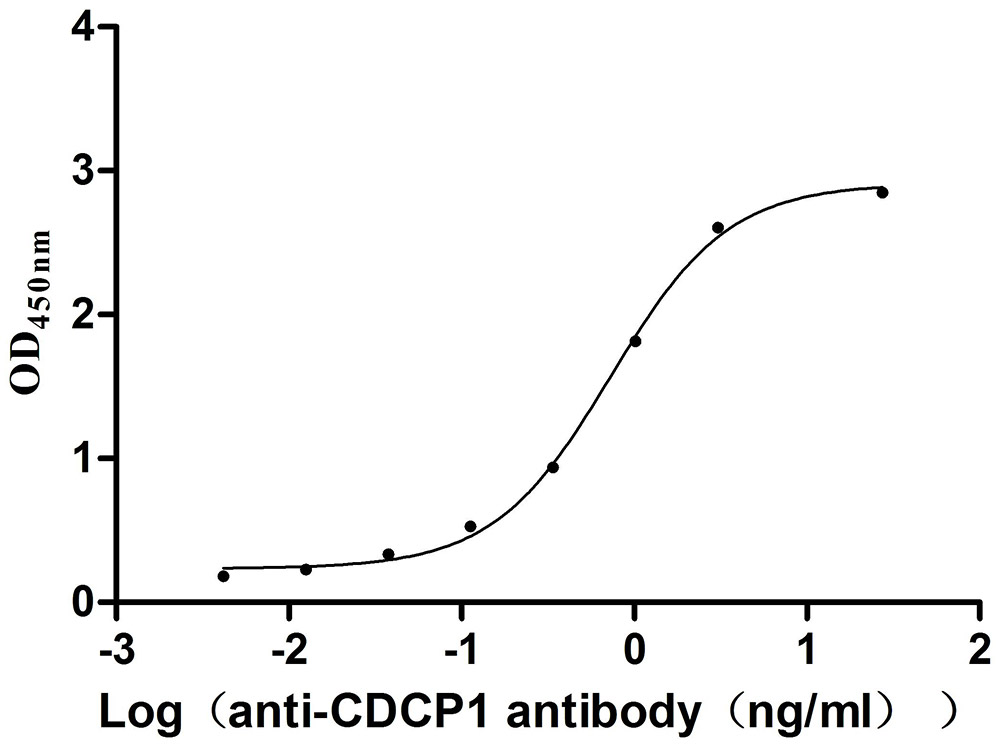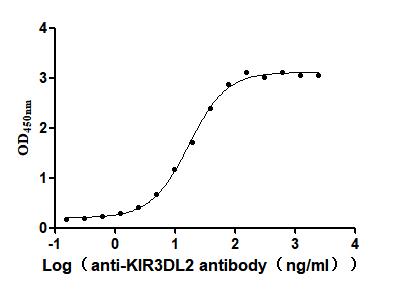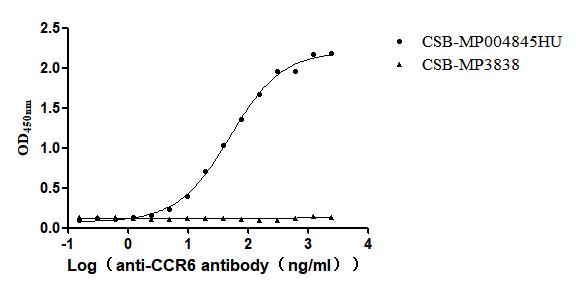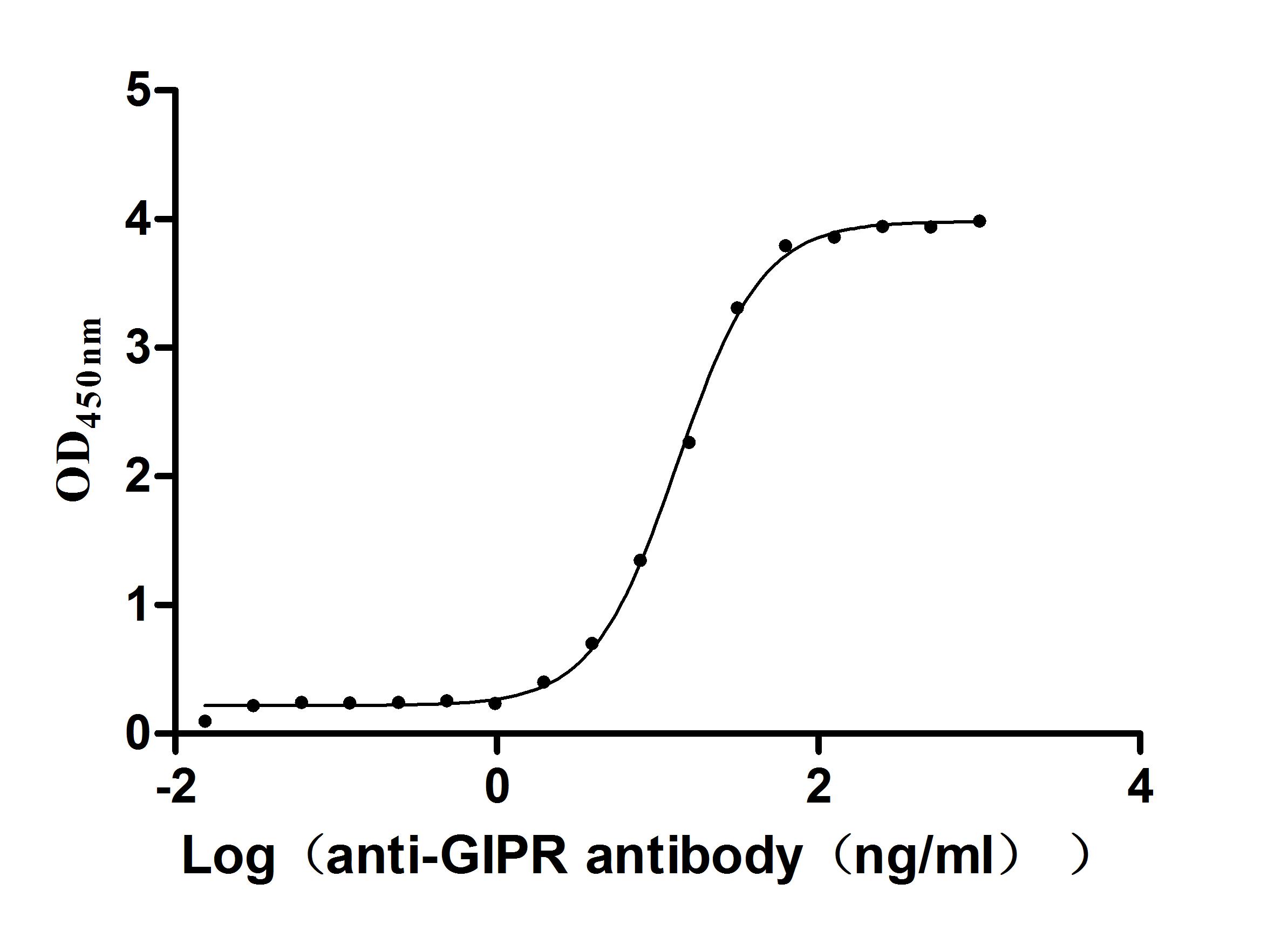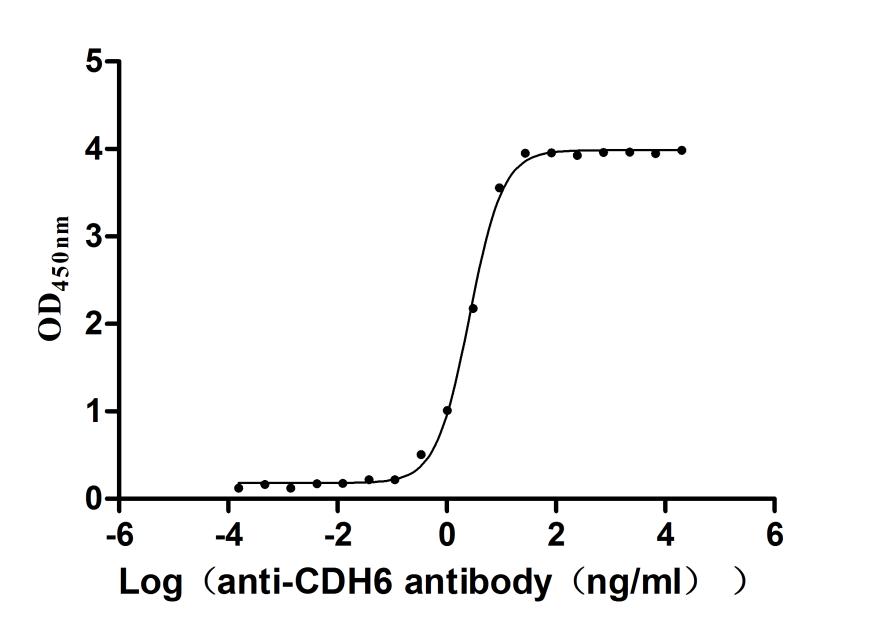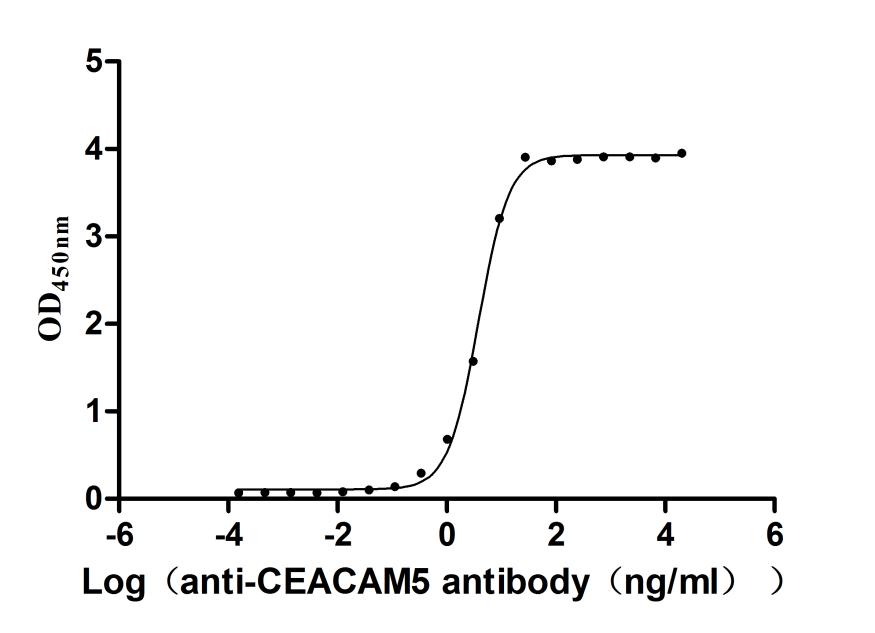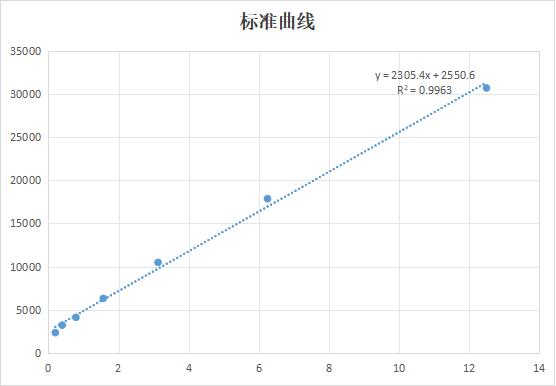Recombinant Human Arylamine N-acetyltransferase 2 (NAT2)
In Stock-
中文名称:人NAT2重组蛋白
-
货号:CSB-EP015471HU
-
规格:¥1836
-
图片:
-
其他:
产品详情
-
纯度:Greater than 90% as determined by SDS-PAGE.
-
基因名:NAT2
-
Uniprot No.:
-
别名:AAC2; ARY2_HUMAN; Arylamide acetylase 2 (N-acetyltransferase 2, isoniazid inactivation); Arylamide acetylase 2; Arylamine N-acetyltransferase 2; HGNC:7646; N-acetyltransferase 2 (arylamine N-acetyltransferase); N-acetyltransferase type 2; NAT-2; NAT2; PNAT; Polymorphic arylamine N-acetyltransferase
-
种属:Homo sapiens (Human)
-
蛋白长度:Full Length
-
来源:E.coli
-
分子量:49.5kDa
-
表达区域:1-290aa
-
氨基酸序列MDIEAYFERIGYKNSRNKLDLETLTDILEHQIRAVPFENLNMHCGQAMELGLEAIFDHIVRRNRGGWCLQVNQLLYWALTTIGFQTTMLGGYFYIPPVNKYSTGMVHLLLQVTIDGRNYIVDAGSGSSSQMWQPLELISGKDQPQVPCIFCLTEERGIWYLDQIRREQYITNKEFLNSHLLPKKKHQKIYLFTLEPRTIEDFESMNTYLQTSPTSSFITTSFCSLQTPEGVYCLVGFILTYRKFNYKDNTDLVEFKTLTEEEVEEVLKNIFKISLGRNLVPKPGDGSLTI
Note: The complete sequence including tag sequence, target protein sequence and linker sequence could be provided upon request. -
蛋白标签:N-terminal 6xHis-SUMO-tagged
-
产品提供形式:Liquid or Lyophilized powder
Note: We will preferentially ship the format that we have in stock, however, if you have any special requirement for the format, please remark your requirement when placing the order, we will prepare according to your demand. -
缓冲液:Tris-based buffer,50% glycerol
-
储存条件:Store at -20°C/-80°C upon receipt, aliquoting is necessary for mutiple use. Avoid repeated freeze-thaw cycles.
-
保质期:The shelf life is related to many factors, storage state, buffer ingredients, storage temperature and the stability of the protein itself.
Generally, the shelf life of liquid form is 6 months at -20°C/-80°C. The shelf life of lyophilized form is 12 months at -20°C/-80°C. -
货期:3-7 business days
-
注意事项:Repeated freezing and thawing is not recommended. Store working aliquots at 4°C for up to one week.
-
Datasheet & COA:Please contact us to get it.
相关产品
靶点详情
-
功能:Participates in the detoxification of a plethora of hydrazine and arylamine drugs. Catalyzes the N- or O-acetylation of various arylamine and heterocyclic amine substrates and is able to bioactivate several known carcinogens.
-
基因功能参考文献:
- NAT2 genetic polymorphism predisposes children with connective tissue dysplasia to adhesion ileus. PMID: 30479108
- It is concluded that the frequency of slow encoding NAT2 haplotype was high among Jordanian volunteers, which may have effects on drug responses and susceptibility to some diseases, such as cancers. PMID: 29173142
- We report a high prevalence of NAT 2 slow acetylators in Ethiopians and a conditional NAT2 genotype-phenotype country-of-residence-based discordance implicating a partial phenotype conversion and metabolic adaptation. Gene-environment interactions regulate NAT2 phenotype. PMID: 29589062
- NAT2 genetic variants are associated with urinary bladder cancer risk. PMID: 28577040
- Letter: in bladder cancer ultra-slow acetylators with the NAT2*6A/*6A genotype have a higher recurrence risk and a shorter recurrence-free time, especially among smokers. PMID: 28040354
- NAT2 polymorphism is not associated with passive smoking associated breast cancer risk. PMID: 29071579
- NAT2 role in the metabolic detoxification of heterocyclic aromatic amines PMID: 28160022
- hydralazine efficacy and safety could be improved by NAT2 genotype-dependent dosing strategies PMID: 29018032
- Studied the association between N-acetyl transferase 2 (NAT2)genetic polymorphisms, environmental factors and risk factors in colon or rectal cancer. PMID: 27883249
- prevalence impaired glucose tolerance higher in obese children carrying the A803 allele PMID: 27481583
- There were significant differences in NAT2(rs1799929, rs1799930) genotype or allele frequencies between the infertile and fertile groups and synergy effects of GSTP1 and NAT2 polymorphisms might lead to significant increase of infertility risk. PMID: 29505746
- The increased risk of prostate cancer was observed among individuals with the NAT2 slow acetylator phenotype PMID: 29165164
- Genotyping of TB patients from south India for NAT2 gene polymorphism revealed that 58 per cent of the study population comprised slow acetylators. Two-hour INH concentrations differed significantly among the three genotypes. PMID: 28574024
- Slow NAT2 acetylators demonstrated a significant association with risk of anti-tuberculosis drug-induced liver injury in Thai patients. PMID: 27725049
- The present study demonstrated no association between NAT2 genotype and drug-induced hepatotoxicity in the north Indian patients with tuberculosis. PMID: 28474630
- SNP-inferred slow acetylation statuses were significantly associated with an approximately 50% decreased risk of bladder cancer PMID: 27223070
- CYP3A4 expression and N-acetyl transferase 2 acetylator phenotype can better identify the patients with higher risk of adverse reactions and can facilitate the improvement of personalized clonazepam therapy and withdrawal regimen. PMID: 27639091
- NAT2 genotypes are associated with N-acetylation phenotype variation. PMID: 28653770
- NAT2 acetylator genotype has an important role in 4, 4'-methylene bis (2-chloroaniline) metabolism and suggest that risk assessments related to 4, 4'-methylene bis (2-chloroaniline) exposures consider accounting for NAT2 acetylator phenotype in the analysis PMID: 29180287
- Review/Meta-analysis: NAT2 slow acetylation genotype is associated with an increased bladder cancer risk in Chinese individuals. PMID: 28182356
- six selected NAT2 exonic single nucleotide polymorphisms were genotyped in an independent case-control sample of a Northern Chinese Han population to verify the possible association between NAT2 and schizophrenia. Three (rs1801280T/341C, rs1799930/G590A, and rs1208/A803G) of the six single nucleotide polymorphisms showed significant allele frequency differences between the case and the control groups. PMID: 28187106
- Our findings suggested that NAT2 gene polymorphism rs1799931 was associated with decreased risk of acute myeloid leukemia and was likely to be a protective factor against acute myeloid leukemia development. PMID: 29049179
- Study reestablished the association between NAT2 SA and isoniazid-induced liver injury in a Singaporean population and demonstrated its clinical validity in prediction of isoniazid-induced liver injury. PMID: 29036176
- In non-syndromic cleft lip with or without cleft palate, we found a significant association between the EGF61 (rs4444903) and NSCL/P (P = .01) genes. Conversely, NAT2 (rs1799929) was not significantly different between the cases and the control group PMID: 28906376
- 182 Hungarian bladder cancer cases and 78 cancer-free controls were investigated. It was not possible to establish a particular impact of NAT2*6A and *7B genotypes (15 cases, 8%, 5 controls, 7%). GSTT1 exerted no marked influence on bladder cancer (negative 21% cases vs. 22% controls). The portion of GSTM1 negative bladder cancer patients was increased (63% cases vs. 54% controls). PMID: 28696897
- Various antitubercular isoniazid dosing regimens have been proposed for NAT2-specific immunocompetent and immune-deficient patient populations. PMID: 27480867
- Data suggest that metabolism (and possibly pharmacokinetics) of hypnotic nitrazepam involves liver enzymes AOX1 (aldehyde oxidase 1), NAT2 (N-acetyltransferase 2), AADAC (arylacetamide deacetylase), and CYP3A4 (cytochrome P450 3A4). PMID: 28606603
- The multicolor melting curve assay described in our study is very promising for the efficient determination of NAT2 genotype, and can facilitate the personalized dosing of isoniazid PMID: 27377479
- No significant differences in the acetylator NAT2 haplotype and phenotype distributions were found between Native American populations practicing farming and/or herding and those practicing hunting and gathering. PMID: 26503810
- In any patient who may receive INH and happens to be NAT2 slow acetylator type, NAT2 genotype by covert action may influence the clinical response of above drugs. PMID: 27487996
- Homozygous mutant allele of NAT2 gene at 481site may act as a predisposing factor for phenytoin intoxication among tuberculous meningitis or tuberculoma patients having seizures. PMID: 27488001
- In the present study, we report that the most common NAT2 haplotype in the Korean population (TACGAGG; frequency = 47.6%) is associated with a low expression level of NAT2. We failed to find a significant relationship between rs4646241 and enzyme expression level. Haplotypes of Caucasian and African populations were markedly different from those of the Korean population. PMID: 27853051
- We genotyped four selected variants of the NAT2 gene (NAT2*5, NAT2*6, NAT2*7, and NAT2*14) by Sanger sequencing. The majority of patients had NAT2 genotypes previously described as slow acetylators including NAT2*5/*5, NAT2*5/*6, NAT2*6/*6, and NAT2*6/*14 (78%) and none were genotyped as rapid acetylators. Controls were slow, intermediate, and rapid acetylators with frequencies of 72.39%, 21.48%, and 6.13%, respectively PMID: 27541622
- this study confirms the significance of the association between slow-acetylator NAT2 variants and susceptibility to AT-DILI in an Indonesian population. PMID: 26911349
- NAT2 gene variants were associated with antituberculosis drug-induced hepatotoxicity. PMID: 27104815
- Single nucleotide polymorphism is associated with different N-acetyltransferase-2 acetylator phenotypes in wordwide population groups. PMID: 27136043
- Association of NAT2 single nucleotide polymorphism and breast cancer risk with smoking in Japanese women PMID: 27068825
- NAT2 slow acetylators have a higher risk of noncardiac gastric adenocarcinoma than intermediate and rapid acetylators have in a Taiwanese population. PMID: 26617241
- NAT2 single nucleotide polymorphism associated with the risk bladder cancer development and interacts with smoking. PMID: 27495060
- NAT2 gene polymorphisms (rs1041983 C/T, rs1801280 T/C, and rs1799930 G/A) in association with long-period active smoking could be the possible individual risk-predicting factors for breast cancer development in the population of Slovak women PMID: 26700672
- Data on NAT2 gene polymorphisms obtained from the current meta-analysis do not support a major association with Parkinson's diease risk, except in Asian populations PMID: 27216438
- Results show that NAT2 polymorphism was associated with increased risk of coronary heart disease in Chinese population. PMID: 26985933
- NAT2 acetylation status and its single nucleotide polymorphisms in the Greenlandic population, including Inuit and European ancestry PMID: 25794903
- Results showed that the NAT2 slow acetylation phenotypes are significantly associated with an increased risk of bladder cancer. PMID: 26585839
- NAT2 slow acetylation state was associated with bladder cancer risk, and was shown to modestly increase the risk of bladder cancer. PMID: 26681036
- the NAT2 slow acetylation genotypes might increase the susceptibility to pancreatic cancer in Europe but that these have no significant effects in the United States and multi-center populations. PMID: 26681215
- Findings suggest that variations in the NAT2 gene and their interactions contribute to occupational diisocyanate asthma susceptibility. PMID: 26641831
- The results suggest that NAT2 is related to cognitive processes dealing with distraction and attentional control in the auditory modality; ultra-slow acetylation status was associated with reduced higher cognitive functions PMID: 26615528
- Individuals with NAT2 slow acetylators may have increased risk of antituberculosis drug-induced liver injury when standard dose of isoniazid was used. [META-ANALYSIS] PMID: 26616266
- Findings support a role for NAT2 in modifying the association between red meat consumption and colorectal cancer in Japanese and African Americans. PMID: 26683305
显示更多
收起更多
-
亚细胞定位:Cytoplasm.
-
蛋白家族:Arylamine N-acetyltransferase family
-
数据库链接:
HGNC: 7646
OMIM: 243400
KEGG: hsa:10
STRING: 9606.ENSP00000286479
UniGene: Hs.2
Most popular with customers
-
Recombinant Human Trophoblast glycoprotein (TPBG), partial (Active)
Express system: Mammalian cell
Species: Homo sapiens (Human)
-
Recombinant Mouse CUB domain-containing protein 1 (Cdcp1), partial (Active)
Express system: Mammalian cell
Species: Mus musculus (Mouse)
-
Recombinant Human Killer cell immunoglobulin-like receptor 3DL2 (KIR3DL2), partial (Active)
Express system: Mammalian cell
Species: Homo sapiens (Human)
-
Recombinant Human C-C chemokine receptor type 6(CCR6)-VLPs (Active)
Express system: Mammalian cell
Species: Homo sapiens (Human)
-
Recombinant Macaca fascicularis Gastric inhibitory polypeptide receptor (GIPR), partial (Active)
Express system: yeast
Species: Macaca fascicularis (Crab-eating macaque) (Cynomolgus monkey)
-
Recombinant Human Cadherin-6(CDH6),partial (Active)
Express system: Mammalian cell
Species: Homo sapiens (Human)
-
Express system: Mammalian cell
Species: Macaca mulatta (Rhesus macaque)
-
Recombinant Human Urokinase-type plasminogen activator(PLAU) (Active)
Express system: Mammalian cell
Species: Homo sapiens (Human)

